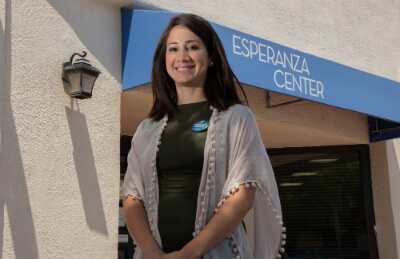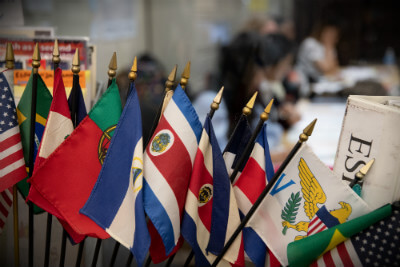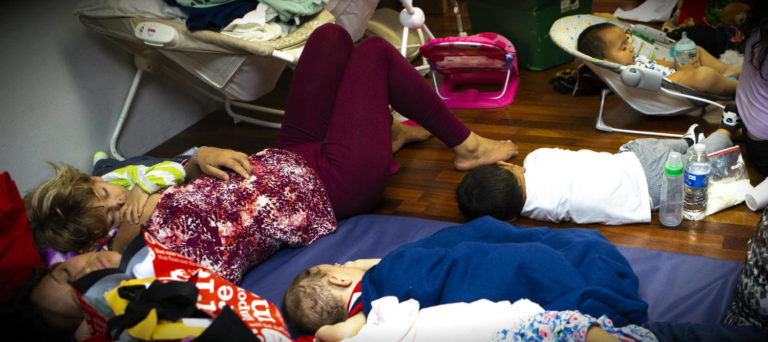At eight-years-old, Helany Sinkler’s greatest comfort while immigrating to the United States from Honduras was the knowledge that she was with her family. No matter the trials they might endure, they would always have each other.
“I was protected in every sense of the word,” said Sinkler, noting that her family made the journey due to a lack of opportunity in their native land. “I didn’t take the journey that the children are taking now. And, to be honest, at eight, I can’t imagine being able to.”
Sinkler speaks with authority.
She manages the family reunification and anti-trafficking program at the Esperanza Center, which is sponsored by Catholic Charities of Baltimore. Its work includes helping reunite unaccompanied minors with a sponsor already living in the United States (generally another family member or close friend).
That mission has grown in scope in recent months.

Against the backdrop of a Department of Homeland Security report of a 203-percent increase in illegal border crossings from March 2017 to March 2018, Attorney General Jeff Sessions announced a “zero-tolerance” policy for people crossing the border illegally April 6.
The resultant separation of approximately 2,300 children from their parents created an uproar.
Hours before President Donald Trump signed an executive order June 20 to stop the separation of families at the border, according to Catholic News Service, Pope Francis said he stood with the U.S. bishops, among them Archbishop William E. Lori, who had condemned the family separation policy.
The situation, which is fluid, saw “Families Belong Together” rallies in hundreds of cities across the U.S. June 30, including in Baltimore’s Patterson Park, just east of the Esperanza Center.
“Historically the United States has been known to be a country that protects children,” Sinkler said. “That’s not the way we protect children; we don’t separate them from their families. It just goes against our American values.”
The fate of the children being held in government shelters while their parents are sent to federal prisons remains unclear, even at agencies such as the Esperanza Center.
“The children, historically, the Esperanza Center has worked with for the past almost five years, were always children who at the time that they crossed the U.S.-Mexico border were not in the company of their parent or legal guardian,” Sinkler said. “We never saw children that came with a biological parent or legal guardian.”
From July 2016 to June 2017, fiscal year 2017, Esperanza Center helped reunite 932 unaccompanied minors with family members.
As a result of the zero-tolerance policy, Sinkler said, as of June 26, the Esperanza Center had worked on 10 cases involving children separated from parents at the U.S.-Mexico border, attempting to unite them with relatives in Maryland. One of those children had been reunited with an extended family member.
“The zero-tolerance policy is another layer of trauma that you’re adding to the minor,” Sinkler said, adding that the U.S. has child protection laws that many other countries do not have.

The Esperanza Center and similar organizations have been instructed by the federal government, Sinkler said, to continue the reunification process with relatives other than parents. Its employees are often asked by sponsors if minors will see their parents again; they have difficulty responding with any certainty, as very little guidance for if and how that will happen has been given.
Sinkler said that after being separated from parents, children need the love and support of other family members.
“Those minors that were separated from their parents are treated now similarly to the unaccompanied minors,” Sinkler said. “They’re going through the sponsorship process.”
Unaccompanied minors usually have only the name and phone number of a potential sponsor when entering the U.S., according to Sinkler. Those children are sent to a shelter, where case managers make first contact with a potential sponsor, asking if he or she knows the child and is willing to be a sponsor.
If the potential sponsor lives in Maryland, he or she can turn for assistance to the Esperanza Center.
“Esperanza” is the Spanish word for “hope.”
Paperwork for family reunification is available in Spanish, but many potential sponsors are unable to read or write in their native language. Staff from the Esperanza Center’s family reunification department can help fill out that paperwork and aid in obtaining additional needed documents, such as birth certificates.
The reunification process requires a background check to confirm the safety and best interest of the child. The Esperanza Center provides digital fingerprinting to the appropriate authorities. Findings are sent directly to the shelter where the child in question is being held.
The Esperanza Center also makes “home studies,” as sometimes requested by shelter case managers, assessing a potential sponsor’s home environment, other residents and physical structure.
After reunification, the Esperanza Center assists a new sponsor in matters such as enrolling the child in school, finding a medical provider, identifying an immigration legal services provider and advocacy services. The Esperanza Center also holds English as a second language (ESL) classes.
The family reunification program has benefited children from India, China and Pakistan, but the majority of its clients, including those affected by the zero-tolerance policy, are from Central America’s Northern Triangle: El Salvador, Guatemala and Honduras.
When employees of Esperanza Center visit with children who have been reunited with family members, Sinkler said, they ask the children their goals. Overwhelmingly, the answer is to feel safe.
Sinkler said that simply being able to go outside and walk in the neighborhood was not possible for these children in their home countries.
“I went back (to Honduras) when I was 14 to try to build my connection to my native land, and I saw firsthand the conditions that are right now present in Honduras,” Sinkler said. “There is lack of … economic opportunities, educational opportunities, a lot of government and political corruption.
“And now, none of that has changed. That has remained, but you’ve added additional layers.”
Sinkler spoke of the rampant organized crime that leads many to flee their homelands.
“Now, you have really violent gangs that are taking over entire communities, that are extorting the different neighborhoods and that have made it very unsafe for individuals to live a relatively peaceful and safe life,” she said. “And so many of our clients tell us over and over again that they are fleeing gang persecution.”
Sinkler said that children she meets possess the strength – both mentally and physically – to experience danger in their home countries, and then to make the journey to a new land in hopes of finding a better life.
“I don’t know that I could have been able to make that journey. And the fact that they do, they just amaze me every day,” Sinkler said of unaccompanied minors. “When I meet them, I am amazed at how resilient they are.”
Sinkler, whose first name is pronounced hel-AH-nee, earned a bachelor’s degree in psychology from Towson University and a master’s in business administration from Loyola University Maryland.
According to the Esperanza Center, Maryland is No. 6 in states with the highest population of undocumented immigrants, behind only California, Florida, Texas, New York and New Jersey.
“It is definitely happening in Maryland,” Sinkler said. “We have to be aware and prepare to welcome these children into our schools, into our communities.”
It is even more imperative, she said, for Catholics to call upon their basic values as “humanitarian crises are happening.”
“We are called to welcome the stranger, to feed the hungry, to serve and love our brothers and sisters, and it doesn’t specify that we only do that to our American or Maryland Catholic brothers and sisters – it is everyone,” Sinkler said. “We are always, as Catholics, in a position to serve. To serve when we can and in any way that we can.”
Email Emily Rosenthal at erosenthal@CatholicReview.org


